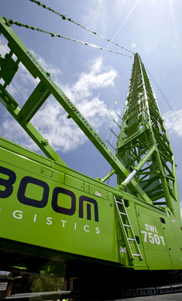
All gloom and no boom
The crane industry in Australia is fragmented and highly exposed to capital-intensive projects in the mining and construction sectors. As such, crane operators do not generate sustainable competitive advantages that will protect earnings during an industry downturn. At Montgomery Investment Management, we have been very vocal about the risks inherent with investment in the mining services sector, and the latest full year result from Boom Logistics has justified this concern.
Boom Logistics is a crane operator that performed very well during the resources boom, due in large part to debt-funded acquisitions. But this debt has burdened the company since the GFC, and management has struggled to deploy assets economically. The company appeared to have turned a corner by posting profits in 2012 that were well above market expectations, but the sharp slowdown of the mining sector in 2013 has considerably impacted the company’s earnings.
In the 2012 year-end results, management expected that Boom would generate Earnings Before Interest and Tax (EBIT) in the range of $47m-$50m for 2013. During the year, the company was forced to issue two downgrades to this guidance as conditions in the mining sector deteriorated. In the 2013 year-end results, the company ultimately reported EBIT of $26m, which was even lower than the most recent guidance.
Management has cited many reasons for the poor performance, which is a reflection of the systemic risk inherent in the sector:
• A downturn in coal and infrastructure sectors and delay in energy projects
• A continuing drive from major mining companies to reduce costs which has resulted in significant variability in activity and a general pushback on service rates
• A seasonal downturn from September to December, compounded by weather events followed by a slower than usual return to normal operating levels
• Changes in demand as customers deal with their own economic issues
The slowdown has also forced the company to write-off surplus assets to the tune of $11 million. The Group’s acquisition of crane companies between 2003 and 2007 has meant that it carries a variety of vehicle brands that have been customised or are not widely accepted by the market.
In light of this, it is difficult to have confidence in the company’s reported value of its assets. Boom has valued its Net Tangible Assets at $0.51 per share, which contrasts with the current share price of $0.15. It would seem that this valuation gap is somewhat indicative of the market lacking confidence in the ability of management to successfully deploy assets.
The company has undergone significant restructuring as a result of the slowdown in the mining sector. In the full year reports, management stated that the company has:
• Reduced the workforce by 12 per cent
• Identified 66 surplus cranes for disposal
• Frozen Senior Executive salaries until FY14
• Redeployed assets after the loss of significant contracts
Despite these efforts, management has acknowledged that further actions are required to restructure the business, including:
• Enterprise Bargaining Agreement negotiations to focus on productivity improvement and a more flexible labour model
• Potential for further redundancies
• Overhead cost reduction initiative with a focus on centralisation of selected support functions
• Redeploying underutilised assets to new regions
• Sale of surplus assets
Boom Logistics provides a perfect example of why we remain cautious about investing in mining services companies: they require a significant margin of safety because there are so many risks that are outside of management’s control. The revenue for Boom Logistics is entirely dependent upon major contracts, and if delays occur, be it through weather, supply problems or market sentiment, there is little management can do but take the hit to their margins. While Boom Logistics may do well when the sector recovers, we will be focusing our attention on companies that can maintain earnings during unfavourable conditions.
This post was contributed by a representative of Montgomery Investment Management Pty Limited (AFSL No. 354564). The principal purpose of this post is to provide factual information and not provide financial product advice. Additionally, the information provided is not intended to provide any recommendation or opinion about any financial product. Any commentary and statements of opinion however may contain general advice only that is prepared without taking into account your personal objectives, financial circumstances or needs. Because of this, before acting on any of the information provided, you should always consider its appropriateness in light of your personal objectives, financial circumstances and needs and should consider seeking independent advice from a financial advisor if necessary before making any decisions. This post specifically excludes personal advice.
INVEST WITH MONTGOMERY
Does you negative assessment of Boom Logistics mean your assessment of another mining services company – Fleetwood – would be equally pessimistic?
Yep.
It makes zero sense to value Boom based on earnings. I have zero faith in the company ability to generate meaningful free cash flows.
The only question os relevance is how much the business is worth dead rather than alive, what the probability of that happening is – unlikely, if it suits current management and the Board to put themselves before investors – and the time until such a wind-up would occur.
This is a company in dire need of change at the Board and a sweep through senior executive ranks. I would ask whether this is a situation with chronically poor management and poor results?